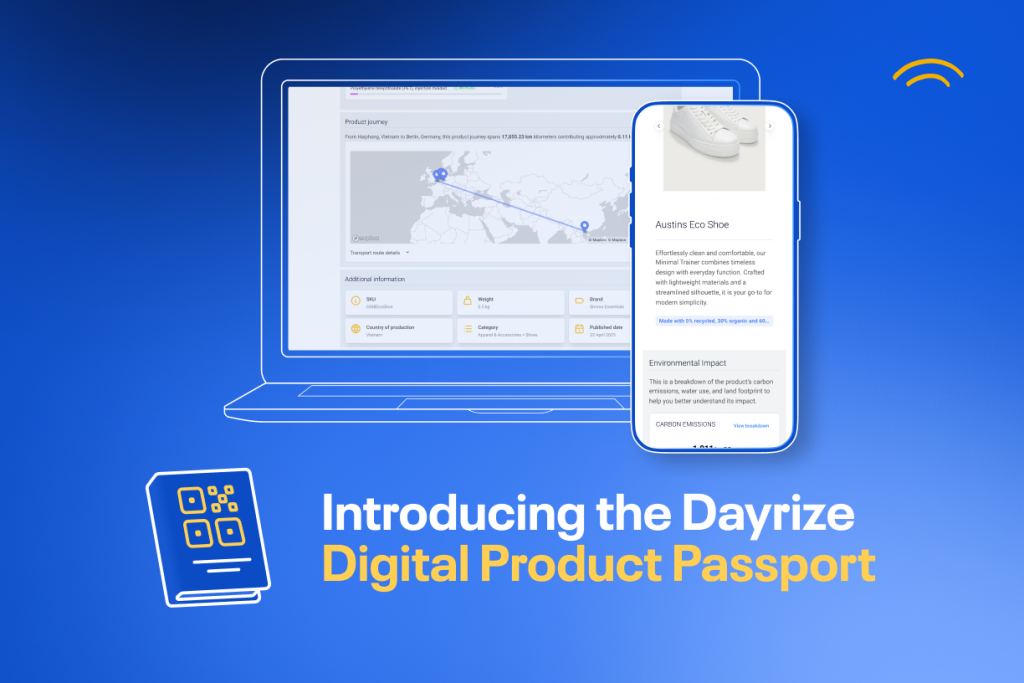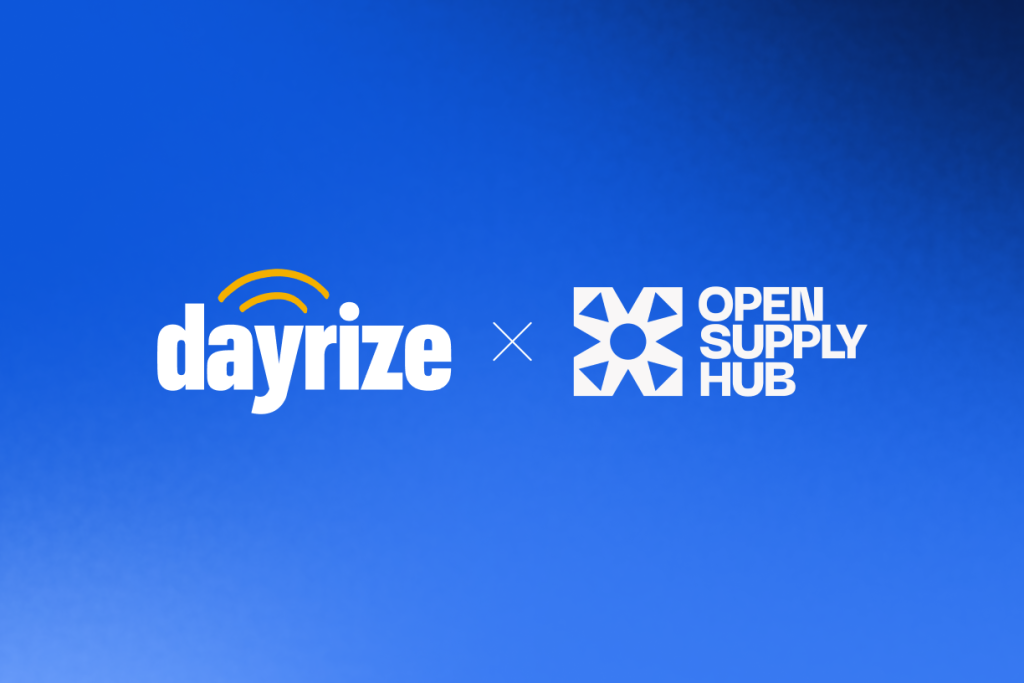
Dayrize has officially launched its Digital Product Passport (DPP) solution – a powerful new tool that blends science, technology, and data to meet EU sustainability regulations with ease. But this is more than a compliance solution. By guiding suppliers through a structured, ISO-aligned process and enabling real-time impact modelling, Dayrize helps brands unlock transparency at the product level, without the need for additional surveys or third-party tools.
In this interview, we sit down with Dayrize Co-Founder Bart Nollen to explore the thinking behind the DPP solution, why supply chain collaboration is key, and how brands can future-proof their sustainability strategies in an increasingly regulated market.
Can you briefly explain what the Digital Product Passport (DPP) is and why it’s becoming essential for brands today?
A Digital Product Passport (DPP) is a comprehensive digital record that contains a product’s complete lifecycle data – from how it’s made and used to its end-of-life disposal. Think of it as a digital identity card that travels with each product, storing crucial information about its origin, materials, environmental impact, and recycling instructions.
DPPs are becoming essential for brands because the European Union is mandating them for nearly all products sold in the EU market starting in 2024, with enforcement beginning between 2026 and 2030. This regulation, part of the Ecodesign for Sustainable Products Regulation (ESPR), aims to make sustainable products the norm and enhance transparency across product value chains. For brands, DPPs are no longer optional, they’re a requirement for EU market access.
What led Dayrize to develop the DPP feature, and how does it align with the broader mission of Dayrize?
Dayrize was founded with the mission to make it easier for businesses and consumers to understand product impacts and bring consumption within planetary boundaries. The DPP feature directly aligns with this mission by providing the transparency and data infrastructure needed to make sustainability measurable and actionable. As Austin Simms, CEO of Dayrize, noted, “Sustainability has evolved from a nice-to-have into a business imperative. The DPP feature empowers companies to position sustainability as a value driver rather than a business cost.”
What are the core capabilities of the new Digital Product Passports?
Digital Product Passports are really changing the game when it comes to sustainability and compliance. They allow businesses to quickly assess the impact of their entire product portfolio, which is a major shift from the traditional, manual methods that can take months.
What’s powerful is how much of the process is automated, from collecting data across multiple sources to standardising it for analysis. That automation doesn’t just save time, but also improves accuracy and makes it much easier to collaborate with suppliers.
The passports also come with built-in tools for regulatory reporting and plug seamlessly into existing business systems, so there’s no need for a heavy technical setup. It’s a smarter, more connected way to manage compliance while driving forward sustainability efforts.
What information is included in each Dayrize Digital Product Passport?
Each Dayrize Digital Product Passport offers a comprehensive, multi-dimensional view of a product’s environmental and social impact across its full lifecycle. At the heart of the passport are three key environmental metrics:
- Carbon Emissions (CO₂e in kilograms): This captures the total greenhouse gas emissions from raw material extraction through to manufacturing, distribution, and delivery to the end customer.
- Land Use (square meters): Beyond measuring the physical space required, this also considers the biodiversity sensitivity of the sourcing locations.
- Water System Impact (liters): This reflects both the volume of water consumed and the stress placed on local water systems throughout the supply chain.
Together, these metrics provide a clear, science-based foundation for understanding and improving product sustainability.
How does Dayrize’s AI platform simplify and scale the upcoming launch of Digital Product Passports?
We’ve built a platform specifically designed to meet the complexity and scale that Digital Product Passports demand. Having already measured the impact of over 30 million products across more than 70,000 materials, we understand what it takes to operationalise sustainability at scale.
Our approach is fully automated and unified; everything from supplier and product data capture to impact assessment and reporting happens in one streamlined system. The platform pulls data from 31 different databases, including 14 proprietary sources, so brands don’t have to rely on time-consuming manual input.
Once the data is in, our AI handles the transformation and standardisation, no matter the format or source. We then apply life cycle assessment methodologies aligned with ISO 14040 and 14044 standards to provide robust, science-backed product impact measurement.
What really sets us apart is usability. We’ve designed the front end to be intuitive for brand, compliance, and commercial teams with no technical expertise required. And because the entire process is automated, we’re able to assess products in minutes rather than the months it traditionally takes.
Ultimately, our goal is to make Digital Product Passports not just a compliance requirement, but a practical, scalable tool for driving real sustainability across global supply chains.
How does Dayrize ensure its Digital Product Passports are fully compliant with the EU’s Ecodesign for Sustainable Products Regulation (ESPR)?
Dayrize is purpose-built to meet the demands of the EU’s Ecodesign for Sustainable Products Regulation. We ensure full compliance by aligning our platform with leading global standards, including ISO 14040, ISO 14044, and the GHG Protocol, providing a solid scientific foundation for all product impact assessments.
Our data model is designed to meet all current ESPR requirements, offering deep, comprehensive coverage across a wide range of environmental indicators. We are able to assess environmental footprints even when supply chain data is incomplete or fragmented. This is something we’ve seen many companies struggle with as regulations tighten.
We also future-proof our platform by regularly updating our methodology to reflect the latest regulatory changes. As ESPR evolves, so do we, giving brands the confidence that their Digital Product Passports remain accurate, reliable, and fully compliant over time.
Dayrize uses a science-based methodology to assess risk and impact across five dimensions. How does this set the platform apart in delivering actionable insights for Digital Product Passports?
While many solutions focus narrowly on carbon, we take a holistic, 360-degree approach, evaluating environmental and social impact across multiple dimensions. Each metric is grounded in the latest scientific research and continuously reviewed by leading experts, ensuring the data stays both credible and current.
We combine globally recognised standards with cutting-edge research to go beyond compliance and deliver insights businesses can actually act on. The platform doesn’t just tell you where your impact lies, it helps you model scenarios and see how changes will affect performance across entire product ranges. That kind of visibility is key to embedding sustainability into product development and decision-making.
What makes Dayrize’s data augmentation and impact assessment tools industry-leading?
It really comes down to scale, speed, and accuracy. Dayrize is powered by the world’s largest database of product impact analytics, allowing us to assess products in minutes instead of the months that traditional methods require.
Our AI-driven system is designed to intelligently fill data gaps without compromising scientific integrity, which is something that’s critical for companies working with fragmented supply chain information. We pull from 31 different databases to ensure assessments are as comprehensive as possible.
And we’ve also made the process far more cost-effective. What once required high-cost, one-off assessments can now be done at scale for a fraction of the price, without spreadsheets or complex integrations. It’s powerful, accessible, and built to scale with your business.
How do you see the role of Digital Product Passports evolving in the next few years?
Digital Product Passports are going to become central to how products are made, sold, and managed. Initially, they’re being rolled out in sectors like batteries, textiles, and electronics but we expect them to expand quickly to cover most consumer goods.
Over time, DPPs will likely integrate directly into consumer platforms, giving buyers real-time sustainability data at the point of purchase. They’ll also unlock new circular business models like repair services, take-back schemes, and reuse programs by making product-level data easily accessible.
On a global scale, standardised sustainability data will help streamline trade and compliance, while also improving supply chain transparency and risk management. Ultimately, DPPs won’t just support compliance, they’ll become a strategic tool for driving innovation in sustainable product design and materials.
What would you say to businesses that are still hesitant about investing in Digital Product Passports?
Hesitation is understandable, but the real risk lies in doing nothing.
Digital Product Passports aren’t just a regulatory requirement; they’re becoming a baseline expectation for market access, transparency, and consumer trust.
But here’s the critical point: the only way to make DPPs viable at scale is through providers and partners who have rethought the model – those using automation, science, and scalable infrastructure to reduce complexity and cost. Without this, the burden falls on your teams and your bottom line.
Forward-thinking businesses are already moving, not just to comply, but to lead. Investing now means staying ahead of regulation, avoiding last-minute scramble, and keeping costs low, not just for you, but for your customers.
To keep up to date with our latest releases and get to know the team behind Dayrize, subscribe to our updates below and follow us on LinkedIn.

